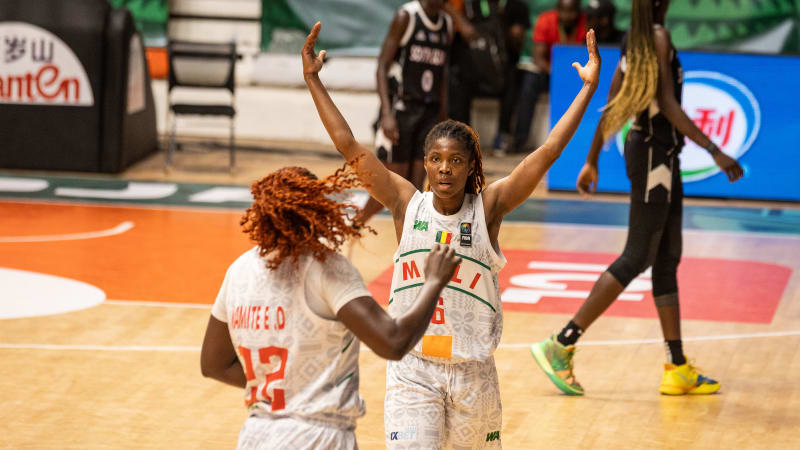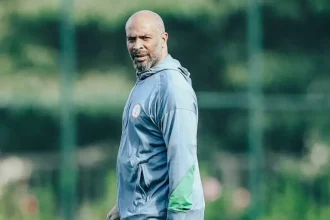Mali has earned another shot at AfroBasket glory after cruising past tournament debutants South Sudan 76-50 to book a place in the final of the 2024 FIBA Women’s AfroBasket.
The commanding win marks the West African nation’s return to the title match, where they will face reigning champions Nigeria in a highly anticipated showdown.
The victory over South Sudan marked the second time Mali bested the newcomers in this competition, but unlike the tense group phase meeting, this semifinal clash was all one-way traffic.
Mali last featured in the AfroBasket final in 2021, when they were bested 70-59 by Nigeria. They missed the 2023 final after losing 75-65 to Senegal and settling for bronze with an emphatic 89-51 win over hosts Rwanda.
Their lone championship came in 2007, and they’re hoping to reclaim the crown after an 18-year drought.
Head coach Oumarou Sidiya and his team will now face a major test as they look to dethrone a Nigerian side chasing a record-extending fifth straight AfroBasket title and a sixth overall.
The winner will also earn automatic qualification to the 2026 FIBA Women’s Basketball World Cup in Berlin, Germany.
Despite Mali’s well-established dominance at the youth level, including U16 and U18 categories, their success has yet to fully translate at the senior level. Sunday’s final offers a golden opportunity to break that barrier.
Fast Start Crushes South Sudan’s Hopes
In their group-stage meeting, South Sudan nearly shocked Mali. This time, the West Africans were determined to avoid a repeat.
Mali imposed themselves early, jumping to a 13-7 lead within five minutes. By the end of the first quarter, they had opened a 29-8 gap and never looked back, extending their lead to a massive 31 points by halftime.
Although South Sudan rallied for a better second half, the damage had already been done.
All-Round Team Effort Powers Mali
Rather than relying on a single standout, Mali’s win was powered by a balanced team performance.
Coach Sidiya took the opportunity to rotate his squad and rest his starters for much of the second half. Sira Thienou led the scoring with 14 points, while Djeneba N’Diaye and Alima Dembele contributed 13 and 11 points, respectively.
Foune Sissoko, the only player who didn’t score, still made her presence felt with five assists and one steal—the highest for the team in both categories.
Numbers Tell the Story
Mali dominated the boards with 54 rebounds to South Sudan’s 38, including 18 offensive rebounds.
The West Africans also shared the ball more effectively, registering 23 assists to their opponents’ eight.
Three-point shooting was a decisive factor. Mali converted 8 of 25 attempts from beyond the arc, while South Sudan only managed 3 of 18.
Notably, Mali’s bench outscored their starters with 42 points, and contributed more than triple South Sudan’s total bench points (13).
A Historic Run for South Sudan
Although their fairy-tale run ends short of the final, South Sudan’s maiden AfroBasket campaign has left a lasting impression.
Entering the tournament through a wildcard after finishing third in the Zone Five qualifiers, they stunned many with their performance and earned a spot in the 2026 Women’s World Cup qualifiers. If FIBA traditions remain, they’ll also return for the 2027 AfroBasket.
Reflecting on the journey, South Sudan shooting guard Sarah Deng said,
“We are a first time team ranked lower than any other team in the competition before coming here and we came out and competed. Mali are a good side, and while we did not have a good start against them, we are proud of what we have achieved.”
Looking Ahead to the Final
Mali now faces a daunting final against a Nigeria team that hasn’t lost an AfroBasket game since 2015. Nigeria’s win in Rwanda last year tied them with Senegal for the most consecutive AfroBasket titles (four), and they now aim to stand alone atop that record.
Mali guard Rokia Doumbia acknowledged the strength of their final opponent but remains focused on the ultimate prize, noting, “Against Nigeria, we will control what we can. We will give them respect as champions but at the end of the day we will focus on our game. We will rest and come back ready to win. We came for that one goal. We have dominated the age group competitions and it is time to do the same with the Women’s AfroBasket.”
Doumbia also credited South Sudan for raising the bar earlier in the tournament, stating, “South Sudan did a great job in this competition. Reaching the Semis is not for everyone. We came out and played the way we should have the first game, we made shots and that was the difference. I must admit that opening match result was a wake-up call for us. It’s not that we were being complacent but we needed that reality.”
With a title at stake and a World Cup ticket on the line, Sunday’s final promises fireworks between Mali’s hungry challengers and Nigeria’s battle-hardened champions.







